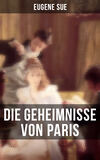Kitabı oku: «The Mysteries of Paris, Volume 6 of 6», sayfa 9
CHAPTER VIII
BICÊTRE
A fortnight had elapsed since Sarah's death, and it was mid-Lent Sunday. This date established, we will conduct the reader to Bicêtre, an immense building, which, though originally designed for the reception of insane persons, is equally adapted as an asylum for seven or eight hundred poor old men, who are admitted into this species of civil invalid hospital when they have reached the age of seventy years, or are afflicted with severe infirmities.
The entrance to Bicêtre is by a large court, planted with high trees, and covered in the centre by a mossy turf, intersected with flower beds duly cultivated. Nothing can be imagined more healthful, calm, or cheerful than the promenade thus devoted to the indigent old beings we have before alluded to. Around this square are the spacious and airy dormitories, containing clean, comfortable beds; these chambers form the first floor of the building, and immediately beneath them are the neatly kept and admirably arranged refectories, where the assembled community of Bicêtre partake of their common meal, excellent and abundant in its kind, and served with a care and attention that reflects the highest praise on the directors of this fine institution.
In conclusion of this short notice of Bicêtre, we will just add that at the period at which we write the building also served as the abode of condemned criminals, who there awaited the period of their execution.
It was in one of the cells belonging to the prison that the Widow Martial and Calabash were left to count the hours till the following day, on which they were to suffer the extreme penalty of the law.
Nicholas, the Skeleton, and several of the same description of ruffians had contrived to escape from La Force the very night previous to the day on which they were to have been transferred to Bicêtre.
Eleven o'clock had just struck as two fiacres drew up before the outer gate; from the first of which descended Madame Georges, Germain, and Rigolette, and from the second Louise Morel and her mother. Germain and Rigolette had now been married for some fifteen days.
We must leave the reader to imagine the glow of happiness that irradiated the fair face of the grisette, whose rosy lips parted but to smile, or to lavish fond words upon Madame Georges, whom she took every occasion of calling "her dear mother." The countenance of Germain expressed a more calm and settled delight. With his sincere affection for the merry-hearted being to whom he was united was mingled a deep and grateful sense of the kind and disinterested conduct of Rigolette towards him when in prison, although the charming girl herself seemed to have completely forgotten all about it, and even when Germain spoke of those days she would entreat him to change the subject, upon the plea of finding all such recollections so very dull and dispiriting. Neither would the pretty grisette substitute a bonnet for the smart little cap worn before her marriage, and certainly never was humility and avoidance of pretension better rewarded; for nothing could have been invented more becoming to the piquant style of Rigolette's beauty than the simple cap à la paysanne, trimmed with a large orange-coloured rosette at each side, contrasting so tastefully with the long tresses of her rich dark hair, now worn in long hanging curls; for, as she said, "she could now allow herself to take a little pains with her appearance."
The fair bride wore a handsome worked muslin collar, while a scarf, of similar colour to the trimmings of her cap, half concealed her graceful, pliant figure, which, notwithstanding her having leisure to adorn herself, was still unfettered by the artificial restraints of stays; although the tight gray silk dress she wore fitted without a fold or a crease over her lightly rounded bosom, resembling the beautiful statue of Galatea in marble. Madame Georges beheld the happiness of the newly married pair with a delight almost equal to their own.
As for Louise Morel, she had been set at liberty after undergoing a most searching investigation, and when a post-mortem examination of her infant had proved that it had come to its death by natural means; but the countenance of the poor victim of another's villainy had lost all the freshness of youth, and bore the impress of deep sorrow, now softened and subdued by gentleness and resignation. Thanks to Rodolph, and the excellent care that had been taken of her through his means, the mother of Louise, who accompanied her, had entirely recovered her health.
Madame Georges having informed the porter at the lodge that she had called by the desire of one of the medical officers of the establishment, who had appointed to meet herself and the friends by whom she was accompanied at half past eleven o'clock, she was requested to choose whether she would await the doctor within doors or in the large square before the building; determining to do the latter, and supporting herself on the arm of her son, while the wife of Morel walked beside her, she sauntered along the shady alleys that bordered this delightful spot, Louise and Rigolette following them.
"How very glad I am to see you again, dear Louise," said the bride. "When we came to fetch you on our arrival from Bouqueval, I wanted to run up-stairs to you, but my husband would not let me; he said I should tire myself, so I stayed in the coach, and that is the reason why we meet now for the first time since – "
"You so kindly came to console me in prison, Mlle. Rigolette," cried Louise, deeply affected. "You are so feeling for all in trouble, whether of body or mind!"
"In the first place, my dear Louise," replied the grisette, hastily interrupting praises that were to her oppressive, "I am not Mlle. Rigolette any longer, but Madame Germain. I do not know whether you heard – "
"That you were married? Oh, yes, I did. But pray let me thank you as you deserve."
"Ah, but Louise," persisted Madame Germain, "I am quite sure you have not learnt all the particulars; how my marriage is all owing to the generosity of him who was at once the protector and benefactor of yourself and family, Germain, his mother, and my own self."
"Ah, yes, M. Rodolph, – we bless his name morning and evening. When I came out of prison the lawyer who had been to see me from time to time, by M. Rodolph's order, told me that, thanks to the same kind friend who had already interested himself so much for us, M. Ferrand (and here at the very mention of the name an involuntary shudder passed over the poor girl's frame) had settled an annuity on my poor father and myself, – some little reparation for the wrongs he had done us. You are aware that my poor dear father is still confined here, though still improving in health."
"And I also know that the kind doctor who has appointed our being here to-day even hopes your dear parent may be enabled to return with you to Paris; he thinks that it will be better to take some decided steps to throw off this malady, and that the unexpected presence of persons your father was in the daily habit of seeing may produce the most favourable effects, – perhaps cure him; and that is what I think will be the case."
"Ah, mademoiselle, I dare not hope for so much happiness."
"Madame Germain, my dear Louise, if it is all the same to you; but to go on with what I was telling you, you have no idea, I am sure, who M. Rodolph really is?"
"Yes, I have, – the friend and protector of all who are unhappy."
"True, but that is not all. Well, as I see you really are ignorant of many things concerning our benefactor, I will tell you all about it."
Then addressing her husband, who was walking before her with Madame Georges, she said, "Don't walk so very fast, Germain, you will tire our mother!" And, with a look of proud satisfaction, she said, turning to Louise, "Does not he deserve to have a good wife? See how attentive he is to his mother! He certainly is very handsome, too, – a thousand times more so than Cabrion, or M. Girandeau, the travelling clerk! You remember him, don't you, Louise?
"Talking of Cabrion puts me in mind to ask you whether M. Pipelet and his wife have arrived yet? The doctor wished them to come here to-day with us, because your father has talked much about them during his wanderings."
"No, they are not here at present, but they will not be long. When we called for them they had already set out."
"And then as for being punctual in keeping an appointment, M. Pipelet is as exact as a clock to the hour and minute! But let me tell you a little more about my marriage and M. Rodolph. Only think, Louise, it was he who sent me with the order for Germain's liberation! You can imagine our delight at quitting that horrid prison. Well, we went home to my room, and there Germain and I together prepared a nice little bit of dinner; but, bless you! we might just as well have spared ourselves the trouble, for, after it was ready, neither of us could eat a bit for joy. When evening came Germain left me, promising to return the next day.
"Well, at five o'clock next morning, I got up and sat down to my work, for I was terribly behindhand with it. As eight o'clock struck some one knocked at the door; who should it be but M. Rodolph! Directly I saw him, I began to thank him from the bottom of my heart for all he had done for Germain and myself. He would not allow me to proceed. 'My kind neighbour,' said he, 'I wish you to give this letter to Germain, who will soon be here. Then you will take a fiacre, and proceed without delay to a small village, near Ecouen, called Bouqueval. Once there, inquire for Madame Georges; and I wish you all imaginable pleasure from your trip.' 'M. Rodolph,' I said, 'pray excuse me, but that will make me lose another day's work and I have already got two to make up for.' 'Make yourself perfectly easy, my pretty neighbour,' said he, you will find plenty of work at Madame Georges's, I promise you; she will prove an excellent customer, I have no doubt, and I have particularly recommended you to her.' 'Oh, that alters the case, M. Rodolph, then I'm sure I shall be but too glad to go.' 'Adieu, neighbour,' said M. Rodolph. 'Good-bye,' cried I, 'and many thanks for so kindly recommending me.'
"When Germain came, I told him all about it; so as we were quite sure M. Rodolph would not send us upon any foolish errand, we set off as blithe as birds. Only imagine, Louise, what a surprise awaited us on our arrival! I declare I can scarcely think of it without tears of happiness coming into my eyes. We went to the very Madame Georges you see walking before us, and who should she turn out to be but the mother of Germain!"
"His mother?"
"Yes, his own very mother, from whom he had been taken when quite a baby! You must try to fancy their mutual joy! Well, when Madame Georges had wept over her son, and embraced and gazed at him a hundred times, my turn came to be noticed.
"No doubt M. Rodolph had written something very favourable about me, for, clasping me in her arms, she said, 'She was acquainted with my conduct towards her son.' 'Then, mother,' interposed Germain, 'it only rests with you to ask her, and Rigolette will be your child as well as I.' 'And I do ask her to be my daughter with all my heart,' replied his mother, 'for you will never find a better or a prettier creature to love as your wife.'
"So there I was quite at home, in such a sweet farm, along with Germain, his mother, and my birds; for I had taken the poor, little, dear things with me, just to hear how delightedly they would sing when they found themselves in the country. The days passed like a dream. I did only just what I liked, – helped Madame Georges, walked about with Germain, and danced and sung like a wild thing.
"Well, our marriage was fixed to take place on yesterday fortnight; the evening before, who should arrive but a tall, elderly, bald-headed gentleman, who looked so kind; and he brought me a corbeille de mariage from M. Rodolph. Only think, Louise, what a beauty it must have been, – made like a large rosewood box, with these words written in letters of gold, on medallion of blue china, 'Industry and Prudence – Love and Happiness.' And what do you suppose this charming box contained? Why, a number of lace caps similar to the one I have now on, pieces for gowns, gloves, ornaments, a beautiful shawl, and this pretty scarf. Oh, I thought I should lose my senses with delight! But that is not all. At the bottom of the box I found a handsome pocketbook, with these words written on a bit of paper affixed to it, 'From a friend to a friend.' Inside were two folded papers, one addressed to Germain, and the other to me. In that addressed to Germain was an order for his appointment as director of a bank for the poor with a salary of four thousand francs a year; while he found under the envelope, directed to me, a money order for forty thousand francs on the treasury, – yes, that's the word; it was called my marriage portion.
"I did not like to take so large a sum, but Madame Georges said to me, 'My dear child, you both can and must accept it, as a recompense for your prudence, industry, and devotion to those who were in misfortune; for did you not run the risk of injuring your health, and probably deprive yourself of your only means of support, by sitting up all night at work, in order to make up for the time you spent in attending to others?'"
"Oh, that is quite true," exclaimed Louise, with fervour. "I do not think there is any one upon earth who would have done all that you have done, Mademoi – Madame Germain!"
"There's a good girl, she has learned her lesson at last! Well, I said to the elderly gentleman that I did not merit such a reward, that what little I had done was purely because it afforded me pleasure. To which he answered, 'That makes no difference; M. Rodolph is immensely rich, and he sends you this dowry as a mark of his friendship and esteem, and your refusal of it would pain him very much indeed. He will himself be present at your marriage, and then he will compel you to take it.'"
"What a blessing that so charitable a person as M. Rodolph should be possessed of such riches!"
"Of course it is! But I haven't told you all yet. Oh, Louise, you never can guess who and what M. Rodolph turns out to be; and to think of my making him carry large parcels for me! But have a little patience, you will hear about it directly.
"The night before the marriage the elderly gentleman came again very late, and in great haste, – it was to tell us that M. Rodolph was ill, and could not attend the wedding, but that his friend, the bald-headed gentleman, would take his place. And then only, my dear Louise, did we learn that our benefactor was – guess what – a prince! A prince, do I say? Bless you, ever so much higher than that! A royal highness! – a reigning duke! – a sort of a second-rate king! Germain explained all about his rank to me!"
"M. Rodolph a prince! – a duke! – almost a king!"
"Just think of that, Louise! And imagine my having asked him to help me to clean my room! A pretty state of confusion it threw me into when I recollected all that, and how free I had spoken to him! So of course you know when I found that he was as good as a king, I did not dare refuse his gracious wedding present.
"Well, my dear, when we had been married about a week, M. Rodolph sent us word that he should be glad if Germain, his mother, and myself would pay him a wedding visit; so we did. I can tell you my heart beat as though it would come through my side! Well, we stopped at a fine palace in the Rue Plumet, and were ushered into a number of splendid apartments, filled with servants in liveries, all covered with gold lace, gentlemen in black, with silver chains around their necks and swords by their sides, officers in rich uniforms, and all sorts of gay looking people. The rooms we passed through were all gilt, and filled with such beautiful things they quite dazzled my eyesight only to look at them.
"At last we got to the apartment where the bald-headed old gentleman was sitting, with a quantity of grand folks, all covered with gold lace and embroidery. Well, when our elderly friend saw us, he rose and conducted us to an adjoining room, where we found M. Rodolph – I mean the prince – dressed so simply, and looking so good and kind – just like the M. Rodolph we first knew – that I did not feel at all frightened at the recollection of how I had set him to pin my shawl for me, mend my pens, and walked with him arm in arm in the street, just like two equals, as, certainly, then I thought we were."
"Oh, I should have trembled like a leaf if I had been you!"
"Well, I did not mind it at all, he smiled so encouragingly; and, after kindly welcoming Madame Georges, he held out his hand to Germain, and then said, smilingly, to me, 'Well, neighbour, and how are "Papa Crétu" and "Ramonette?"' (Those were the names I called my birds by. Was it not kind of him to recollect them?)
"'I feel quite sure,' added he, 'that yourself and Germain can sing as merry songs as your birds.' 'Yes, indeed, my lord,' replied I (Madame Georges had taught me as we came along how I was to address the prince), 'we are as happy as it is possible to be, and our happiness is the greater because we owe it to you.'
"'Nay, nay, my good child,' said he, 'you may thank your own excellent qualities and that of Germain for the felicity you enjoy,' etc. I need not go on with that part of the story, Louise, because it would oblige me to repeat all the charming praises I received; and, certainly, I cannot recollect ever doing more than my strict duty, though the prince was pleased to think differently.
"Well, we all came away more sorrowful than we went, for we found it was to be our farewell visit to our benefactor, he being about to return to Germany. Whether or not he has gone I cannot tell you, but, absent or present, our most grateful remembrance and respectful esteem will ever attend him.
"I forgot to tell you that a dear, good girl I knew when we were both in prison together had been living at the farm with Madame Georges; it seems my young friend had, fortunately, found a friend in M. Rodolph, who had placed her there. But Madame Georges particularly cautioned me not to say a word on the subject to the prince, who had some reason for desiring it should not be talked about, – no doubt because he could not bear his benevolent deeds should be known. However, I learnt one thing that gave me extreme pleasure, that my sweet Goualeuse had found her parents, and that they had taken her a great, great way from Paris; I could not help feeling grieved, too, that I had not been able to wish her good-bye before she went.
"But forgive me, dear Louise, for being so selfish as to keep talking to you of every one's happiness when you have so much reason to be sorrowful yourself."
"Had my child but been spared to me," said poor Louise, sadly, "it would have been some consolation to me; for how can I ever hope to find any honest man who would make me his wife, although I have got money enough to tempt any one."
"For my part, Louise, I feel quite sure that one of these days I shall see you happily married to a good and worthy partner, who will pity you for your past troubles, and love and esteem you for the patience with which you endured them."
"Ah, Madame Germain, you only say so to try and comfort me; but whether you really believe what you say or no, I gratefully feel and thank you for your kindness. But who are these? I declare, M. and Madame Pipelet! How very gay he looks; so different from the sad, dejected appearance he always wore, while M. Cabrion was tormenting him as he did!"
Louise was right. Pipelet advanced in high spirits, and as though treading on air; on his head he wore the well-known bell-crowned hat, a superb grass-green coat adorned his person, while a white cravat, with embroidered ends, was folded around his throat, in such a manner as to permit the display of an enormous collar, reaching nearly up to his eyes, and quite concealing his cheeks. A large, loose waistcoat, of bright buff, with broad maroon-coloured stripes, black trousers, somewhat short for the wearer, snowy white stockings, and highly polished shoes completed his equipment.
Anastasie displayed a robe of violet-coloured merino, tastefully contrasted with a dark blue shawl. She proudly exhibited her freshly curled Brutus wig to the gaze of all she met, while her cap was slung on her arm by its bright green strings, after the manner of a reticule.
The physiognomy of Alfred – ordinarily so grave, thoughtful, and dejected – was now mirthful, jocund, and hilarious. The moment he caught a glimpse of Rigolette and Louise, he ran towards them, exclaiming in his deep, sonorous voice, "Delivered! Gone!"
"How unusually joyful you seem, M. Pipelet," said Rigolette. "Do pray tell us what has occasioned such a change in your appearance!"
"Gone! I tell you, mademoiselle, – or, rather, madame, as I may, do, and ought to say, now that, like my Anastasie, you are tied up for life."
"You are very polite, M. Pipelet; but please to tell me who has gone?"
"Cabrion!" responded M. Pipelet, inspiring and respiring the air with a look of indescribable delight, as though relieved of an enormous weight; "he has quitted France for ever – for a perpetuity! At length he has departed, and I am myself again."
"Are you quite sure he has gone?"
"I saw him with my eyes ascend the diligence, en route for Strasburg with all his luggage and baggage; that is to say, a hat-case, a maul-stick, and a box of colours."
"What is my old dear chattering about?" cried Anastasie, as she came puffing and panting to the spot where the little group were assembled; "I'll be bound he was giving you the history of Cabrion's going off – I'm sure he has talked of nothing else all the way we came."
"Because I'm half wild with delight; I seem to have got into another world, – such a lightness has come over me. A little while ago my hat used to seem as though loaded with lead, and as if it pressed forwards in spite of me; now I seem as though borne on the breeze towards the firmament, to think that he is gone – actually set out – and never to return!"
"Yes, the blackguard is off at last!" chimed in Madame Pipelet.
"Anastasie," cried her husband, "spare the absent! Happiness calls for mercy and forbearance on our parts. I will obey its dictates, and merely allow myself to remark that Cabrion was a – a – worthless scoundrel!"
"But how do you know that he has gone to Germany?" inquired Rigolette.
"By a friend of our 'king of lodgers.' Talking of that dear man, you haven't heard that, owing to the handsome manner in which he recommended us, Alfred has been appointed house-porter to a sort of charitable bank, established in our house by a worthy Christian, who wishes, like M. Rodolph, to do all the good he can?"
"Ah!" replied Rigolette. "And, perhaps, you don't know, either, that my dear Germain is appointed manager of this same bank? All owing to the kind intervention of M. Rodolph."
"Well, I never!" exclaimed Madame Pipelet, "all our good luck comes together; and I'm sure I'm heartily glad we shall keep old friends and acquaintances around us. I hate fresh faces, for my part. I'm certain I would not change my old duck of a husband even for your young handsome one, Madame Germain.
"But to go back to Cabrion. Only imagine a bald-headed, stout, elderly gentleman, coming to tell us of Alfred's new situation, and at the same time inquiring if a talented artist of the name of Cabrion did not once lodge in the house with us. Oh, my poor darling! Directly Cabrion's name was mentioned down went the boot he was mending, and if I had not caught him he would have swooned away. But, fortunately, the bald gentleman added, 'This young painter has been engaged by a very wealthy person to do some work, which will occupy him for years, and he may, very probably, establish himself in another country.' In confirmation of which the old gentleman gave my Alfred the date of Cabrion's departure, with the address of the office from which he started."
"And I had the unhoped-for satisfaction of reading on the ticket, 'M. Cabrion, artist in painting, departs for Strasburg, and further, by the company's diligence.' The hour named was for this morning. I need not say I was in the inn yard with my wife."
"And there we saw the rascal take his seat on the box beside the driver."
"Just as the vehicle was set in motion Cabrion perceived me, turned around, and cried,'Yours for ever! I go to return no more.' Thank heaven! The loud blast of the guard's horn nearly drowned these familiar and insulting words, as well as any others he might have intended to utter. But I pity and forgive the wretched man, – I can afford to be generous, for I am delivered from the bane and misery of my life."
"Depend upon it, M. Pipelet," said Rigolette, endeavouring to restrain a loud fit of laughter, – "depend upon it, you will see him no more. But listen to me, and I will tell you something I am sure you are ignorant of and which it will be almost difficult for you to credit. What do you think of our M. Rodolph not being what we took him for, but a prince in disguise, – a royal highness!"
"Go along with you!" said Anastasie. "That is a joke!"
"Oh, but really," cried Rigolette, "I am not joking; it is as true as – as – that I am married to my dear Germain."
"Goodness gracious me!" exclaimed Anastasie. "My king of lodgers a royal highness! Oh, dear, here's a pretty go! And I asked him to mind the lodge for me. Oh, pardon! Pardon! Pardon!" And then, carried away by the excess of her reverence and regret for having so undervalued a prince, though a disguised one, Madame Pipelet placed her cap on her head, as though she imagined herself in the presence of royalty.
Alfred, on the contrary, manifested his respect for royalty in a manner diametrically the reverse of the form adopted by his wife. Snatching off his hat, that hat which had never before been seen to quit his head, he commenced bowing to empty space, as though standing in the presence of the august personage he apostrophised, while he exclaimed, "Have I, then, been honoured by a visit from royalty? Has my poor lodge been so far favoured? And to think of his illustrious eyes having seen me in my bed, when driven thither by the vile conduct of Cabrion!"
At this moment Madame Georges, turning around, cried out:
"My children, the doctor comes."
Doctor Herbin, the individual alluded to, was a man of about the middle age, with a countenance expressive of great kindness and benevolence, united to extreme skill and penetration in discovering the extent of malady with which his unfortunate patients were affected. His voice, naturally harmonious, assumed a tone of gentle suavity when he spoke to the poor lunatics; who, however bereft of reason, seemed always to listen with peculiar delight to his soft, soothing words, which frequently had the effect of subduing the invariable irritability attendant on this fearful complaint. M. Herbin had been among the first to substitute, in his treatment of madness, sympathy and commiseration for the frightful remedies ordinarily employed. He abandoned the coercive system, so repugnant to every principle of humanity, for kind words, conciliating looks, and a ready attention to every request that could reasonably be granted. He banished chains, whips, drenching with cold water, and even solitary confinement, except in cases of urgent necessity.
"Monsieur," said Madame Georges, addressing the doctor, "I have ventured hither with my son and daughter, although personally unknown to M. Morel; but my interest in his unfortunate state made me desirous of witnessing the experiment you are about to make to restore his reason. You have every hope of succeeding, have you not?"
"I certainly reckon much, madame, on the good effects likely to be produced by the sight of his daughter and the persons he has been in the constant habit of seeing."
"When my husband was arrested," said Morel's wife, pointing to Rigolette, "our kind young friend here was nursing me and my children."
"And my father knew M. Germain quite well," said Louise; then directing the attention of M. Herbin to Alfred and Anastasie, she added, "Monsieur and madame here were porters at the house, and assisted our family to the utmost of their ability."
"I am greatly obliged to you, my worthy friend," said the doctor, addressing Alfred, "for quitting your occupation to come hither; but I see by your amiable countenance that you have cheerfully sacrificed your time to visit your poor lodger here."
"Sir-r!" replied Pipelet, gravely bowing. "Men should help each other in this sublunary world, and remember that all are brothers; added to which your unfortunate patient was the very cream and essence of an honest man, and therefore do I respect him."
"If you are not afraid, madame," said Doctor Herbin to Madame Georges, "of the sight of the poor creatures here, we will cross some of the yards leading to that part of the building where I have deemed it advisable to remove Morel, instead of allowing him to accompany the others to the farm as usual."
"The farm!" exclaimed Madame Georges. "Have you a farm here?"
"Your surprise is perfectly natural, madame. Yes, we have a farm, the produce of which is most serviceable to the establishment, although entirely worked by the patients."
"Is it possible? Can you make these lunatics work, and allow them to be at liberty while they do so?"
"Certainly; exercise, the calm tranquillity of the fields, with the aspect of nature, are among our most certain means of cure. Only one keeper goes with them, and we have rarely had an instance of any patient endeavouring to get away; they are delighted to be employed, and the trifling reward they gain serves still to improve their condition, by enabling them to purchase different little indulgences. But we have reached the gate conducting to one of these courts." Then perceiving a slight appearance of alarm on the countenance of Madame Georges, the doctor added, "Lay aside all apprehension, madame; in a very few minutes you will feel as tranquil as I do myself."










